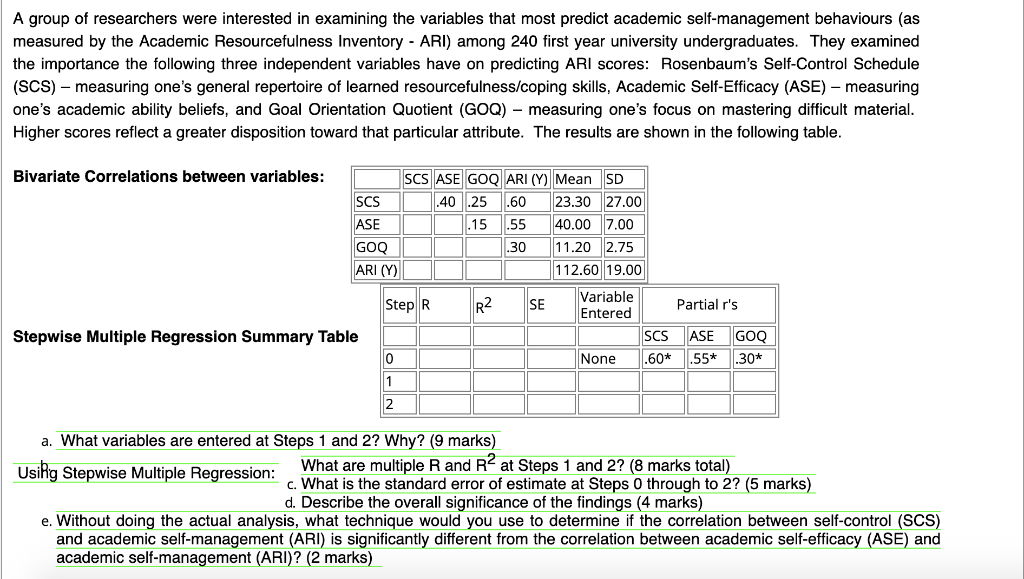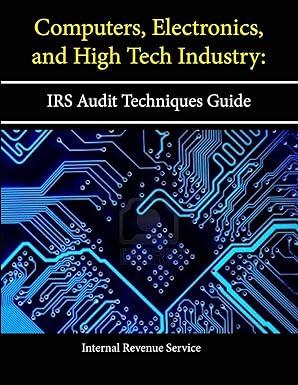 show all work
show all work
A group of researchers were interested in examining the variables that most predict academic self-management behaviours (as measured by the Academic Resourcefulness Inventory - ARI) among 240 first year university undergraduates. They examined the importance the following three independent variables have on predicting ARI scores: Rosenbaum's Self-Control Schedule (SCS) measuring one's general repertoire of learned resourcefulness/coping skills, Academic Self-Efficacy (ASE) - measuring one's academic ability beliefs, and Goal Orientation Quotient (GOQ) - measuring one's focus on mastering difficult material. Higher scores reflect a greater disposition toward that particular attribute. The results are shown in the following table. Bivariate Correlations between variables: SCS ASE GOQ ARI (Y) Mean SD SCS .40 .25 .60 23.30 27.00 ASE .15 .55 40.00 7.00 GOO .30 11.20 2.75 ARI (Y) 112.60 19.00 Variable Step R R2 SE Entered Stepwise Multiple Regression Summary Table SCS 0 None .60* Partial r's ASE 55* GOQ .30* 1 2 a. What variables are entered at Steps 1 and 2? Why? (9 marks) Using Stepwise Multiple Regression: What are multiple R and R2 at Steps 1 and 2? (8 marks total) c. What is the standard error of estimate at Steps 0 through to 2? (5 marks) d. Describe the overall significance of the findings (4 marks) e. Without doing the actual analysis, what technique would you use to determine if the correlation between self-control (SCS) and academic self-management (ARI) is significantly different from the correlation between academic self-efficacy (ASE) and academic self-management (ARI)? (2 marks) A group of researchers were interested in examining the variables that most predict academic self-management behaviours (as measured by the Academic Resourcefulness Inventory - ARI) among 240 first year university undergraduates. They examined the importance the following three independent variables have on predicting ARI scores: Rosenbaum's Self-Control Schedule (SCS) measuring one's general repertoire of learned resourcefulness/coping skills, Academic Self-Efficacy (ASE) - measuring one's academic ability beliefs, and Goal Orientation Quotient (GOQ) - measuring one's focus on mastering difficult material. Higher scores reflect a greater disposition toward that particular attribute. The results are shown in the following table. Bivariate Correlations between variables: SCS ASE GOQ ARI (Y) Mean SD SCS .40 .25 .60 23.30 27.00 ASE .15 .55 40.00 7.00 GOO .30 11.20 2.75 ARI (Y) 112.60 19.00 Variable Step R R2 SE Entered Stepwise Multiple Regression Summary Table SCS 0 None .60* Partial r's ASE 55* GOQ .30* 1 2 a. What variables are entered at Steps 1 and 2? Why? (9 marks) Using Stepwise Multiple Regression: What are multiple R and R2 at Steps 1 and 2? (8 marks total) c. What is the standard error of estimate at Steps 0 through to 2? (5 marks) d. Describe the overall significance of the findings (4 marks) e. Without doing the actual analysis, what technique would you use to determine if the correlation between self-control (SCS) and academic self-management (ARI) is significantly different from the correlation between academic self-efficacy (ASE) and academic self-management (ARI)? (2 marks)
 show all work
show all work 





